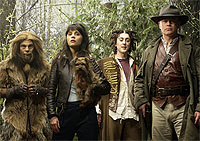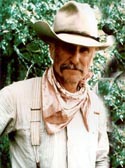The three-night, six-hour telecast of Tin Man just earned Sci Fi Channel the biggest audience for a miniseries in the network's history, outdoing even Taken and Dune. Average audience for the imaginative reworking of L. Frank Baum's Wonderful Wizard of Oz: 5.3 million viewers.
For a broadcast network, that's no big deal. It's about the same number of viewers as ABC's Big Shots or October Road, which, in last week's list of prime-time programs, ended up ranked in the 80s. But for cable, it's a very big deal. Last week, the only cable offerings more popular than the first installment of Tin Man were two prime-time NFL games.

The biggest achievement, and lesson, of Tin Man, though, is this: the miniseries form, long abandoned by the broadcast networks, is very much alive and well. Sci Fi doesn't make too many long-form dramas, but promotes heavily the ones it does, and selects ambitious and interesting projects. The broadcast networks are foolish for not doing the same.
Ever since Lost, the broadcast networks have tried, but mostly failed, to hook viewers with complicated serialized series that unspool their stories over an entire season. Time and again, viewers have rejected all but the best of such shows, suggesting strongly that it's just too much to ask, these days, to have people make season-long commitments to too many shows.
But a concentrated three-night chunk of time - that's doable. And even if it's riskier financially in the short run, there are other payoffs. ABC once made its reputation as much on long-form TV - Roots, Thorn Birds, Winds of War, East of Eden - as anything else. Today, when "branding" is such an all-important concept, ABC and CBS, especially, could benefit from mounting some high-class, short-term special offerings again.

CBS, which gave us the spectacular Lonesome Dove in 1989, gives us Comanche Moon, anther chapter in Larry McMurtry's Dove saga, next month (now rescheduled to begin January 13). But on the broadcast network front, that's about it.
At this year's Emmy Awards, only three entrants competed for Outstanding Miniseries, and not one was from a commercial broadcast network. Broken Trail, by American Movie Classics, was the winner - and it was a Western starring Robert Duvall, just like Lonesome Dove.
It's not an exaggeration, but it is an embarrassment, to note than in this century to date, only five miniseries have been nominated for Emmys from commercial broadcast networks - all from either CBS or ABC. In 2001, ABC boasted two excellent ones, Life with Judy Garland: Me and My Shadows and Anne Frank. Since then, the only nominated miniseries not from PBS or cable have been relative tossaways: ABC's Dinotopia and, from CBS, Hitler: Rise of Evil and Elvis.
Compare that to 1989, the year of Lonesome Dove on CBS. Also nominated that year, from its commercial competitors: NBC's I Know My First Name Is Steven and ABC's The Women of Brewster Place and War and Remembrance.
One way for these networks to attract and retain viewers in this increasingly fragmented media age, I firmly believe, is to rededicate themselves to the miniseries form.
For that, of course, you need writers...